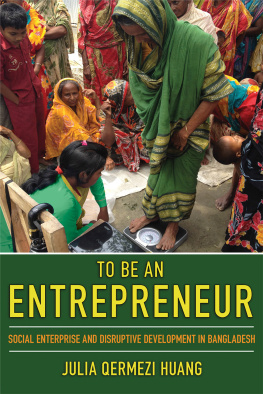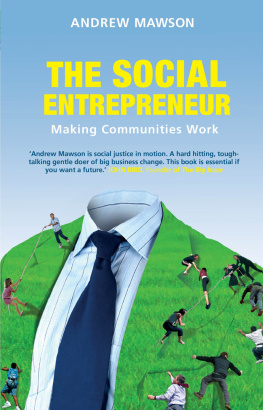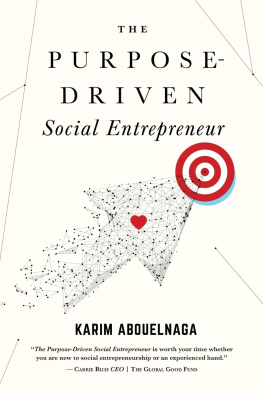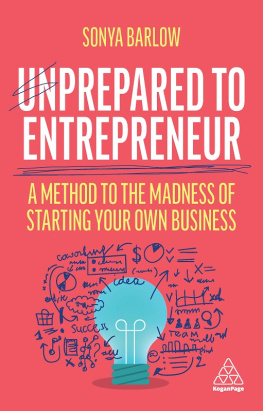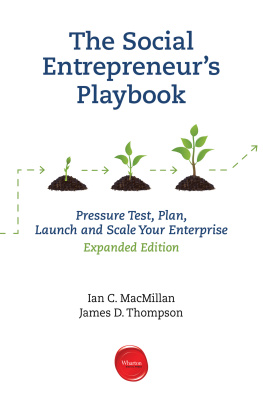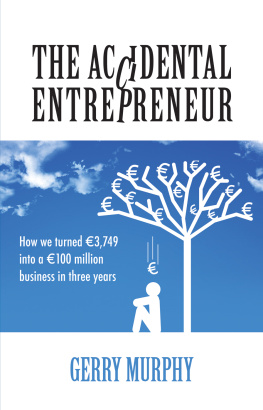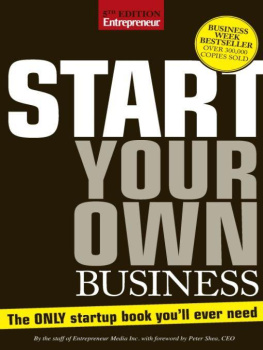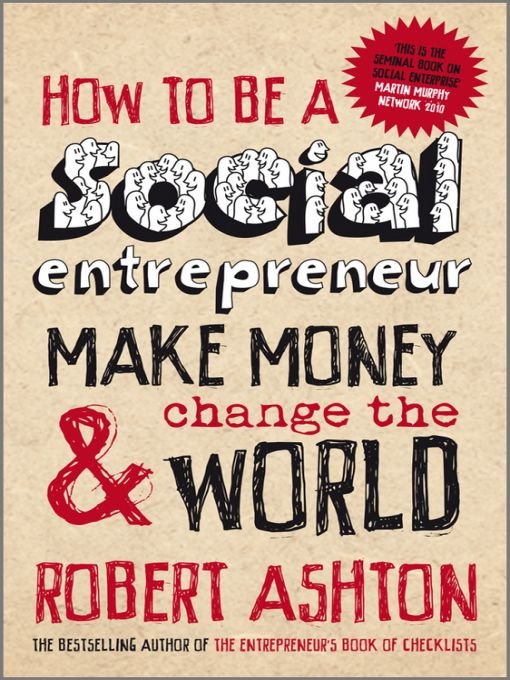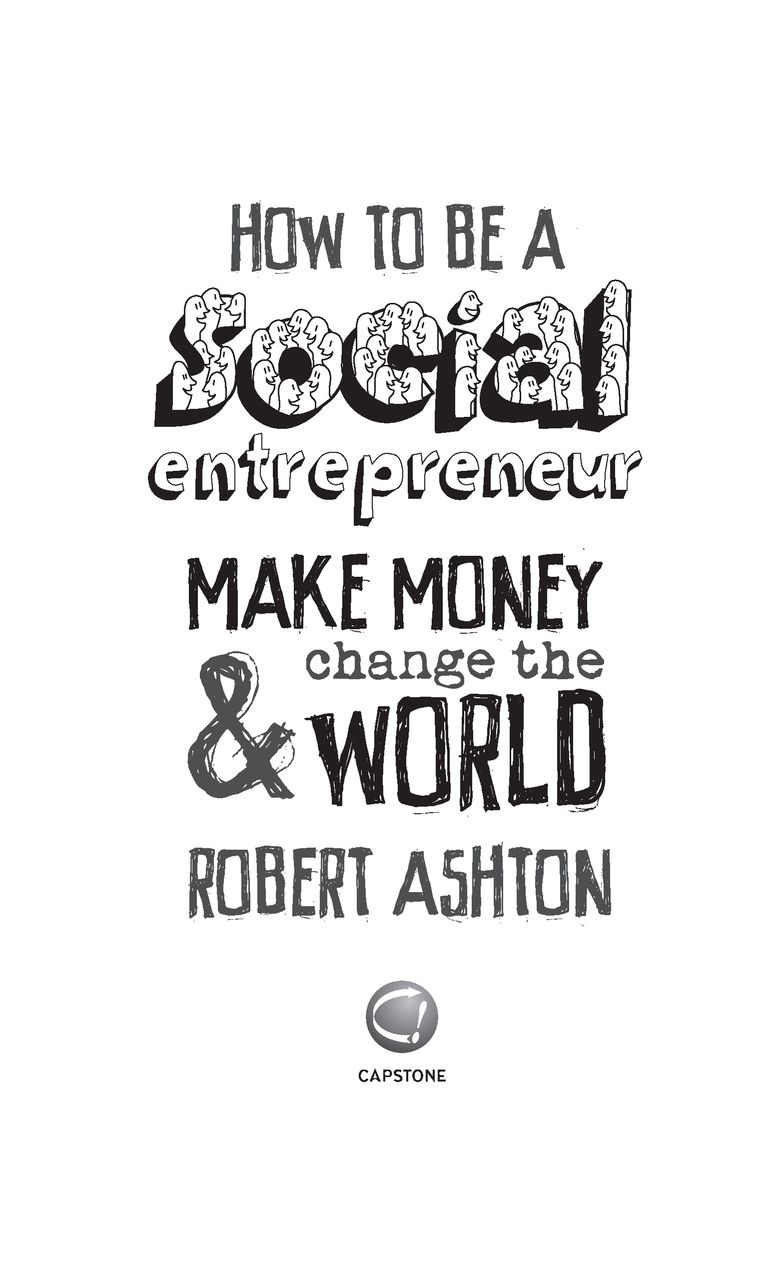Table of Contents
How to be a Social Entrepreneur is an essential read for any aspiring or existing social entrepreneu r. Full of practical examples of real life social enterprise scenarios and written in Roberts usual uncomplicated format, this book has elements everyone in this sector can implement in their aims to make a difference and harvest a social profit.
Marc Davies, Wales Co-operative Centre Limited, walescoop.com
As a director of a community led Community Interest Company confronting both the challenges and opportunities for a social enterprise working with the Public sector I found this book wide ranging, accessible and rather reassuring. It tells me what I need to know in language I can understand.
Jenny Morris Bradshaw, Hartismere Health and Care CIC, Suffolk
Youve got to get your hands dirty if you want to be a social entrepreneur dont pontificate just do it. Grit under the nails and hard work is what counts if you want to build a successful social enterprise, after all youre building a business not going on a Sunday stroll. This very practical book will guide you as to what it takes to be a social entrepreneur. Enjoy it and then do it!
Lord Andrew Mawson OBE, author ofThe Social Entrepreneur: Making Communities Work, amawsonpartnerships.com
Social enterprises need social entrepreneurs. This book will help you decide is youve got what it takes to be one.
Peter Couchman, Chief Executive, Plunkett Foundation, plunkett.co.uk
A comprehensive, accessible and valuable guide for those setting out on the social enterprise journey and reassuring advice for those already well on the road. I was genuinely impressed by how comprehensive it is!
Peter Holbrook, CEO, Social Enterprise Coalition, socialenterprise.org.uk
Anybody with a passing interest in creating a better world should read this book. Robert skillfully manages to hold our interest with a variety of real-life case studies while equipping us with all the tools we need to imagine, establish and grow our own social enterprises.
Paul Fleckney, Budding Social Entrepreneur, Melbourne, Australia
In this time of global economic recovery, we need more social enterprises to champion the architect of change to make the world a better place for all. Roberts book is a treasure filled with practical insight and knowledge that will give you the edge to start, grow a sustainable and successful social enterprise!
Stephen Gyasi-Kwaw, CEO /Founder Youth Enhancement Int. Host Global Entrepreneurship Week -Ghana, Fellow of School for Social Entrepreneurs UK
A refreshing take on the social enterprise phenomenon, with a welcome emphasis on the nitty gritty aspects; I particularly enjoyed the section on sales, which is a fundamental topic too often neglected.
Andy Brady, 3rd Sector Futures, Anglia Ruskin University, anglia.ac.uk
Robert offers plenty of practical advice, illustrated by examples of people who are already out there doing their bit to change society for good. So if you want to change the world, but arent quite sure where to start, then this is the book for you.
Rob Greenland, www.thesocialbusiness.co.uk
Acknowledgements
Writing a book is perhaps as close (being a man) as I can ever get to having a baby. You court a number of commissioning editors before finally clinching a deal. Then the project grows inside you until eventually you go into a literary labour and force it out. Next it screams out for attention on Amazon and from bookstores around the world, demanding attention and, we all hope, winning the admiration of many. And of course you also have the launch party to wet its head.
This is my 12th book and so to develop the analogy, youd think it would pop out in a flash with little pain. If only that were the case! A book on social enterprise needs a lot of careful pre-natal research. This particular baby has emerged into a world where many people have strong views on social enterprise and not everybody agrees. Id like to thank those Ive consulted for their generous input. Not all are mentioned and some were ignored, but thats life I guess!
So who else deserves thanks for their part in making this book possible? Well we have to start with Ellen Hallsworth who saw the potential and a deal was struck over coffee at the Tate Modern. Her assistant, Jenny Ng, ran an expert, gently critical eye over the manuscript, helping me knock off the rough edges and fill in a few gaps. And of course the marketing team has also played a key role in this book arriving in your hand.
My labour pains were eased by my team here at Turnpike Farm. Bella kept our other work commitments at bay whilst Jess checked the first draft and made sure the case studies were accurate.
Finally of course, it fell upon Belinda my long suffering wife to hold my hand, offer soothing words and stroke my anxious brow as I pushed all 50 000 words out. Without her tolerance, fortitude and common sense I would surely have died in labour.
Introduction
My good friend Edward, an IT expert, mentioned that I was writing this book to one of his clients. They are long established advisers working in the charity sector who also run training workshops for people wanting to start social enterprises. Their response illustrates perfectly why this book has such an important job to do.
Who wants to read a book about how to be a social entrepreneur? they said, seemingly surprised that anyone would do such a thing. And that is the problem this book seeks to address. The fact is that for those who want to make a difference, and do it in a way that is financially sustainable; this book is an essential read. It tells you how to do change the world and make money, by becoming a social entrepreneur.
Traditionally the weak and vulnerable in society have been helped along by charitable giving. Coffee mornings, gala dinners and sponsored sporting endeavours and street collections, together with public funding have enabled the charity sector to grow to meet the ever present need.
As funding tightened, so social enterprise became fashionable, but it was never really taken as seriously as it ought. Some of course rose to the challenge magnificently, transforming lives, taking control and leading the way. Others saw it as a route to more funding and never really believed any social enterprise could be self sustaining.
The second decade of the 21st century marked a significant shift in the way people see the world. For the duration of this decade, it is unlikely that politicians in any nation will have money to spare. Funding for health, education, social welfare and more will be bitterly fought over and barely sufficient when won.
Climate change has leapt from a fringe anxiety to a major driver of behavioural change, by everyone and almost every organisation around the world. Change creates opportunity as well as confusion and a new generation of community organisations is emerging to generate power, grow local food and re-build communities.
As the pundits are increasingly predicting, tomorrows entrepreneur will be a social entrepreneur. More confident shaking hands than shaking a collecting tin; more confident negotiating innovative, collaborative partnerships with those able to help them further the cause and more confident that profit is good, because of the freedom it gives you to do good.


